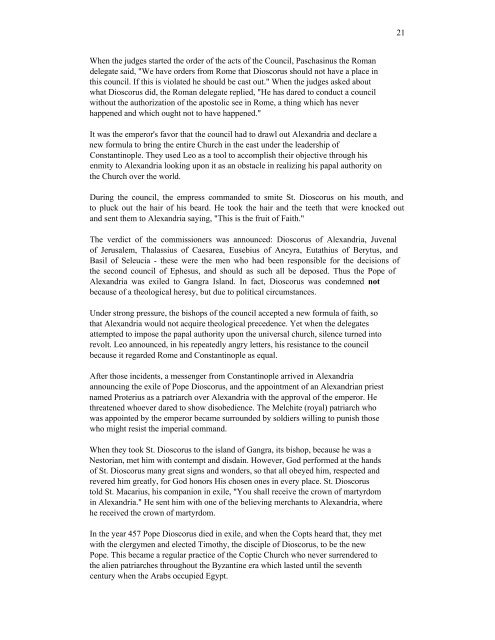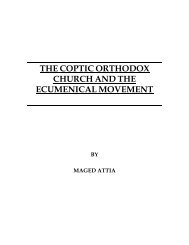Coptic interpretations of the Fourth Ecumenical Council - Saint Mina ...
Coptic interpretations of the Fourth Ecumenical Council - Saint Mina ...
Coptic interpretations of the Fourth Ecumenical Council - Saint Mina ...
Create successful ePaper yourself
Turn your PDF publications into a flip-book with our unique Google optimized e-Paper software.
When <strong>the</strong> judges started <strong>the</strong> order <strong>of</strong> <strong>the</strong> acts <strong>of</strong> <strong>the</strong> <strong>Council</strong>, Paschasinus <strong>the</strong> Roman<br />
delegate said, "We have orders from Rome that Dioscorus should not have a place in<br />
this council. If this is violated he should be cast out." When <strong>the</strong> judges asked about<br />
what Dioscorus did, <strong>the</strong> Roman delegate replied, "He has dared to conduct a council<br />
without <strong>the</strong> authorization <strong>of</strong> <strong>the</strong> apostolic see in Rome, a thing which has never<br />
happened and which ought not to have happened."<br />
It was <strong>the</strong> emperor's favor that <strong>the</strong> council had to drawl out Alexandria and declare a<br />
new formula to bring <strong>the</strong> entire Church in <strong>the</strong> east under <strong>the</strong> leadership <strong>of</strong><br />
Constantinople. They used Leo as a tool to accomplish <strong>the</strong>ir objective through his<br />
enmity to Alexandria looking upon it as an obstacle in realizing his papal authority on<br />
<strong>the</strong> Church over <strong>the</strong> world.<br />
During <strong>the</strong> council, <strong>the</strong> empress commanded to smite St. Dioscorus on his mouth, and<br />
to pluck out <strong>the</strong> hair <strong>of</strong> his beard. He took <strong>the</strong> hair and <strong>the</strong> teeth that were knocked out<br />
and sent <strong>the</strong>m to Alexandria saying, "This is <strong>the</strong> fruit <strong>of</strong> Faith."<br />
The verdict <strong>of</strong> <strong>the</strong> commissioners was announced: Dioscorus <strong>of</strong> Alexandria, Juvenal<br />
<strong>of</strong> Jerusalem, Thalassius <strong>of</strong> Caesarea, Eusebius <strong>of</strong> Ancyra, Eutathius <strong>of</strong> Berytus, and<br />
Basil <strong>of</strong> Seleucia - <strong>the</strong>se were <strong>the</strong> men who had been responsible for <strong>the</strong> decisions <strong>of</strong><br />
<strong>the</strong> second council <strong>of</strong> Ephesus, and should as such all be deposed. Thus <strong>the</strong> Pope <strong>of</strong><br />
Alexandria was exiled to Gangra Island. In fact, Dioscorus was condemned not<br />
because <strong>of</strong> a <strong>the</strong>ological heresy, but due to political circumstances.<br />
Under strong pressure, <strong>the</strong> bishops <strong>of</strong> <strong>the</strong> council accepted a new formula <strong>of</strong> faith, so<br />
that Alexandria would not acquire <strong>the</strong>ological precedence. Yet when <strong>the</strong> delegates<br />
attempted to impose <strong>the</strong> papal authority upon <strong>the</strong> universal church, silence turned into<br />
revolt. Leo announced, in his repeatedly angry letters, his resistance to <strong>the</strong> council<br />
because it regarded Rome and Constantinople as equal.<br />
After those incidents, a messenger from Constantinople arrived in Alexandria<br />
announcing <strong>the</strong> exile <strong>of</strong> Pope Dioscorus, and <strong>the</strong> appointment <strong>of</strong> an Alexandrian priest<br />
named Proterius as a patriarch over Alexandria with <strong>the</strong> approval <strong>of</strong> <strong>the</strong> emperor. He<br />
threatened whoever dared to show disobedience. The Melchite (royal) patriarch who<br />
was appointed by <strong>the</strong> emperor became surrounded by soldiers willing to punish those<br />
who might resist <strong>the</strong> imperial command.<br />
When <strong>the</strong>y took St. Dioscorus to <strong>the</strong> island <strong>of</strong> Gangra, its bishop, because he was a<br />
Nestorian, met him with contempt and disdain. However, God performed at <strong>the</strong> hands<br />
<strong>of</strong> St. Dioscorus many great signs and wonders, so that all obeyed him, respected and<br />
revered him greatly, for God honors His chosen ones in every place. St. Dioscorus<br />
told St. Macarius, his companion in exile, "You shall receive <strong>the</strong> crown <strong>of</strong> martyrdom<br />
in Alexandria." He sent him with one <strong>of</strong> <strong>the</strong> believing merchants to Alexandria, where<br />
he received <strong>the</strong> crown <strong>of</strong> martyrdom.<br />
In <strong>the</strong> year 457 Pope Dioscorus died in exile, and when <strong>the</strong> Copts heard that, <strong>the</strong>y met<br />
with <strong>the</strong> clergymen and elected Timothy, <strong>the</strong> disciple <strong>of</strong> Dioscorus, to be <strong>the</strong> new<br />
Pope. This became a regular practice <strong>of</strong> <strong>the</strong> <strong>Coptic</strong> Church who never surrendered to<br />
<strong>the</strong> alien patriarches throughout <strong>the</strong> Byzantine era which lasted until <strong>the</strong> seventh<br />
century when <strong>the</strong> Arabs occupied Egypt.<br />
21








